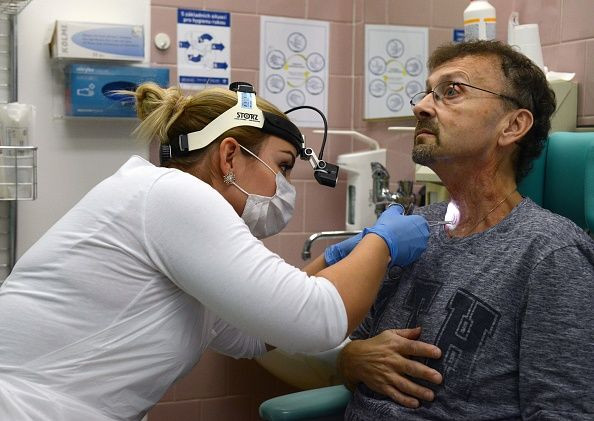Treatment For Hyperthyroidism Can Increase Risk Of Cancer Mortality, Says Study

Treatment for hyperthyroidism or overactive thyroid with radioactive iodine (RAI) is slightly associated with increased risk of mortality among cancer patients, says a study.
RAI is a treatment method extensively used to treat overactive thyroid since the 1940s. Overactive thyroid is a condition in which thyroid gland produces lot of thyroxine hormones. During the treatment, the thyroid gland completely absorbs the iodine and destroys all the overactive cells.
This method of treating hyperthyroidism is widely considered to be very effective and safe. But a new research that was released on Monday suggested that there is a modest association between the overall absorption of radioactive iodine by various organs and the increased risk of solid cancer deaths.
For the study, the researchers observed over 18,800 patients from the UK and the US with overactive thyroid. The participants were treated through radioactive iodine. Most of the participants in the study suffered from Graves’ disease, which is a type of hyperthyroidism that is caused due to an autoimmune disorder.
The academics observed the participants in the research, which was funded by the National Cancer Institute, for at least 70 years. At the end of the study, they found a significant association between the absorption rate of radioactive iodine and mortality rate in female breast cancer patients.
“We estimated that for every 1,000 patients treated currently using a standard range of doses, about 20 to 30 additional solid cancer deaths would occur as a result of the radiation exposure,” lead author Cari Kitahara, who is an investigator with the National Cancer Institute's Division of Cancer Epidemiology and Genetics, said in a statement.
The researcher also revealed that her team was unable to find a significant association between the increased risk of cancer mortality and the absorption of radioactive iodine by various organs in the previous analysis of the study that was published nearly 20 years ago.
The academics had to observe the participants for an addition of two more decades for coming to the latest conclusion, Kitahara revealed. She added that the extra time the team took for making the final conclusion helped them in precisely calculating the amount of radiation each organ absorbed.
The researchers concluded the study by stating that “the results of this study provide quantitative estimates of the risks of radiation-associated cancer deaths in RAI-treated patients with hyperthyroidism, which were previously not well understood, and suggest that the risk of death from solid cancer (including breast cancer) increases with the greater absorbed dose to exposed organs and tissues.”
“Additional studies are needed to fully weigh the risks and advantages of RAI and other major treatment options available to patients with hyperthyroidism,” the scientists added.
© Copyright IBTimes 2025. All rights reserved.




















